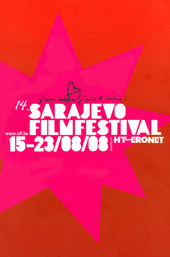|
14th Sarajevo Film Festival (August 15-23, 2008)
A Heartland
by Mohsen Beigaqa
|
 This year’s edition of Sarajevo Film Festival opened with Snow (Aida Begic), which had already won Grand Prix of the best film (Semaine de la critique) from Cannes Film Festival (2008). It was warmly received by the audience and extra showtimes were considered. Perhaps there are few festivals that are so overwhelmed by a film which has not taken part in competition section. Snow has been produced in cooperation with Iran’s Center of Documentary and Semi-Experimental Films, whose director, Mohammad Afarideh, seems to have hit the target. Afarideh maintained that if Iran had helped Bosnia in time of war, it could as well help that country in time of peace through cultural assistance. What can be said about a war which has been so heart-rending? What kind of war may lead to laying siege to a city for four years and pounding it by 5,000 mortar shells per day? European countries did not intervene in a war which began at the heart of Europe on the threshold of the 21th century and did not care about it until after the massacre in Srebrenitsa. When you leave small airport of Sarajevo (which was connected to the city in time of war through a narrow tunnel) you can see marks of bullets and mortar shells on walls. After the war, about 70 percent of inhabitants are Muslims. They say that western countries sent canned food to Sarajevo, but only food supplies sent by Iran were never expired. The beautiful city is surrounded by mountains on four sides and houses are built on the most beautiful hilltops. This year’s edition of Sarajevo Film Festival opened with Snow (Aida Begic), which had already won Grand Prix of the best film (Semaine de la critique) from Cannes Film Festival (2008). It was warmly received by the audience and extra showtimes were considered. Perhaps there are few festivals that are so overwhelmed by a film which has not taken part in competition section. Snow has been produced in cooperation with Iran’s Center of Documentary and Semi-Experimental Films, whose director, Mohammad Afarideh, seems to have hit the target. Afarideh maintained that if Iran had helped Bosnia in time of war, it could as well help that country in time of peace through cultural assistance. What can be said about a war which has been so heart-rending? What kind of war may lead to laying siege to a city for four years and pounding it by 5,000 mortar shells per day? European countries did not intervene in a war which began at the heart of Europe on the threshold of the 21th century and did not care about it until after the massacre in Srebrenitsa. When you leave small airport of Sarajevo (which was connected to the city in time of war through a narrow tunnel) you can see marks of bullets and mortar shells on walls. After the war, about 70 percent of inhabitants are Muslims. They say that western countries sent canned food to Sarajevo, but only food supplies sent by Iran were never expired. The beautiful city is surrounded by mountains on four sides and houses are built on the most beautiful hilltops.
A heart has been chosen as symbol of Sarajevo, which is quite relevant after the peace. They remember a time when the most expensive room at the most luxurious Holiday Inn Hotel was one which lacked windows in order to be immune to mortar shells. They used to bury the dead at night because even graveyard was not safe from enemy fire. At that time, a soccer stadium was turned into a cemetery to make room for more dead bodies. The stadium was reconstructed after the war with the help from Barcelona and NATO also built a big mosque in 2000, called Indonesia Mosque, and presented it to people of Sarajevo.
Vestiges of war can be seen everywhere. Perhaps people may complain why another movie about war? However, after a while, they start carefully to talk about war and related issues. The main prize of competition section was given to a Croatian film, Buick Riviera (Goran Rusinovic) which was about hidden layers of war and its aftershocks. It is about two Serb and Croat men who fight after running into each other in the United States. The Croat man who is called Hassan intends to get rid of the Serb and to prevent him from entering his house. However, his American wife asks, “Didn’t you say that you would never say no to a stranger?” This leads to a new challenge in their life. Film’s attractive satire leads to a bitter ending. To humiliate the Croat man, the Serb buys his Buick sedan at a high price not knowing that the Croat has already cut its brake wire!
SUBSCRIBE
[Page: 130]
|
|
|
|
|
President & Publisher
Massoud Mehrabi
Editors:
Sohrab Soori
Massoud MehrabiZohreh Khatibi
Contributors
Shahzad Rahmati
Saeed Ghotbizadeh
Advertisements
Mohammad Mohammadian
Art Director
Babak Kassiri
Ad Designers
Amir Kheirandish
Hossein Kheirandish
Cover Design
Alireza Amakchi
Correspondents
E.Emrani & M. Behraznia (Germany)
Mohammad Haghighat (France)
A. Movahed & M. Amini (Italy)
Robert Richter (Switzerland)
F. Shafaghi (Canada)
B. Pakzad (UAE)
H. Rasti (Japan)
Print Supervisors
Shad-Rang
Noghreh-Abi
Gol-Naghsh
Subscription & Advertising Sales
Address: 10, Sam St., Hafez Ave., TEHRAN, IRAN
Phone: +98 21 66722444
Fax: +98 21 66718871
info@film-magazine.com
Copyright: Film International
© All rights reserved,
2023, Film International
Quarterly Magazine (ISSN 1021-6510)
Editorial Office: 5th Floor, No. 12
Sam St., Hafez Ave., Tehran 11389, Iran
*
All articles represent views of their
authors and not necessarily
those of the editors
|
|
|

